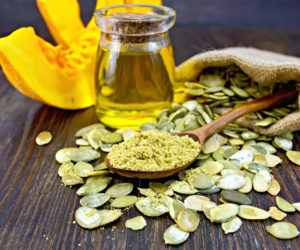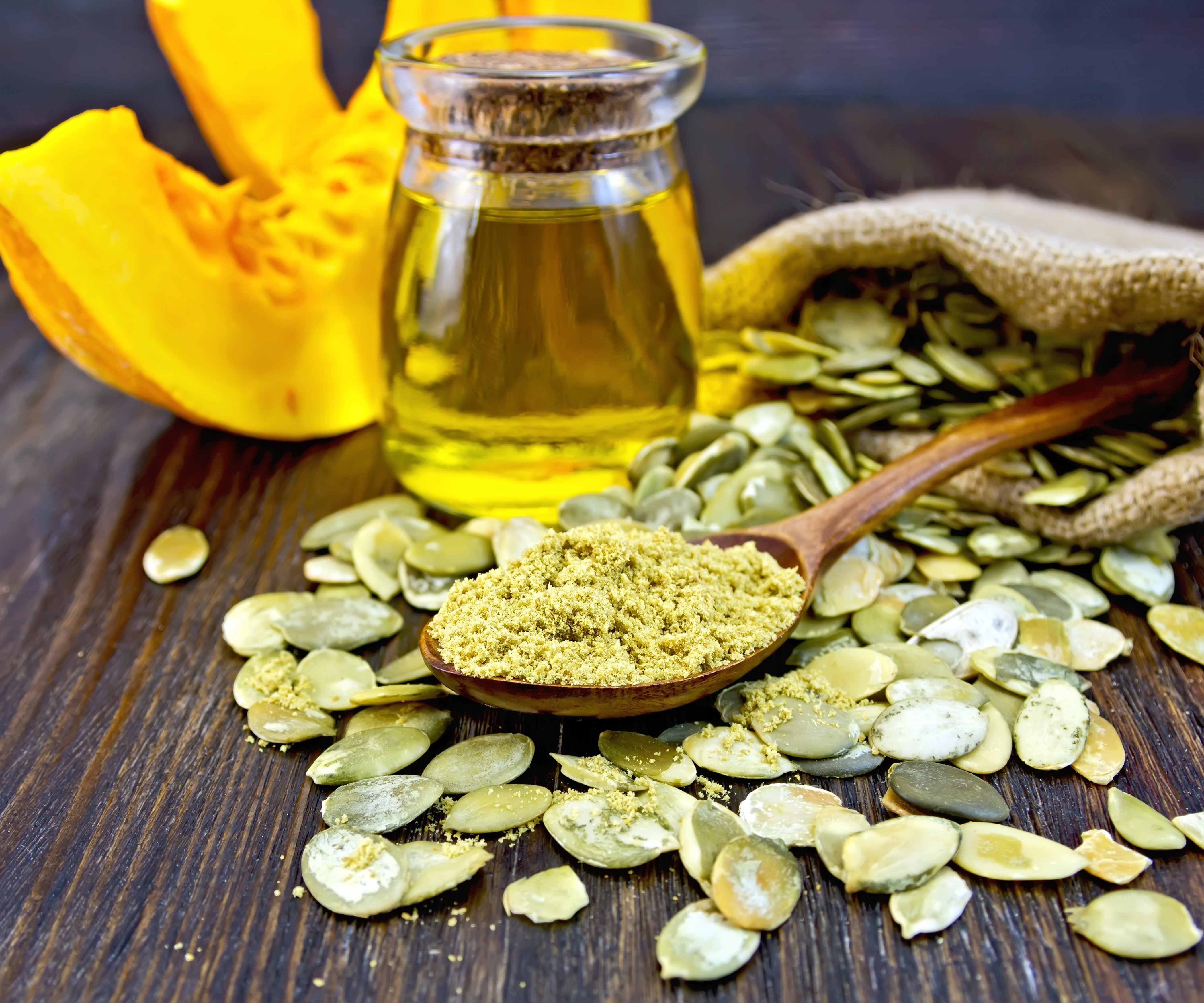
Also known as pepita oil or ‘green gold’, pumpkin seed oil is loved by professional and home chefs all over the world for its remarkable health benefits and amazing smell and flavor when used when cooking.
If you are a bit iffy when it comes on to pumpkin seed oil, then take a moment to learn all there is to know about pumpkin seed oil benefits. You might be surprised by what you will discover!
Where does it come from?
Pumpkin seed oil, like the name suggests, comes from the seed of a pumpkin, but not any kind of pumpkin can make the cut. This oil is made from a special type of pumpkin known as the Styrian pumpkin which is native to Austria.
Traditionally made in Europe for over 300 years, the unhusked seeds are dried, roasted and pressed using a mortar and pestle until the dark oil begins to form. This oil can take on a dark green or dark orange-red color, depending on its thickness, and is bottled and sold in many parts of the world, including the US.
What is it used for?
Pumpkin seed oil is used widely in the culinary arena in salad dressing, desserts, stews, and soups. Aside from cooking, pumpkin seed oil has many other applications. These include:
Hair and skin care
Many persons who suffer from hair loss and balding, especially men, use pumpkin seed oil capsules to stimulate hair growth without experiencing any adverse effects. Some women who suffer from traction alopecia also find this oil to be useful.
And, since pumpkin seed oil is a natural antioxidant, it is used to reduce skin inflammation along with the appearance of age-related wrinkles and blemishes.
Heart health
While many people think of fats and oils as being unhealthy, the “good” fats such as pumpkin seed oil which contain oleic and linoleic acids are necessary for regulating blood pressure and cholesterol which helps to prevent various heart conditions such as heart attacks, stroke, and atherosclerosis.
Cancer prevention
Over the years, a number of studies have been conducted which support the idea that pumpkin seed oil may be useful in reducing the chances of developing colon cancer, breast cancer and even prostate cancer due to its anti-inflammatory properties.
Mental health
Pumpkin seed oil is great for reducing the number of stress hormones present in the body and boosting mood. If you suffer from anxiety and/or depression, it is a great natural remedy and is a much better alternative to antidepressants that have many negative side effects.
Menopause
Women who are going through menopause use pumpkin seed oil to treat many of the symptoms associated with it as such as cramps, joint pain, hot flashes, and headaches. There have also been noticeable increases in HDL cholesterol levels and decreased in diastolic blood pressure.
Nutritional Facts
Unlike many other oils, pumpkin seed oil is not just 100% oil. In fact, its fat concentration is just about 30% to 50%.
In a serving size of 2 teaspoons, organic pumpkin seed oil has:
Calories: 120
Calories from fat: 122
Total Fat: 14g
Saturated fat: 1.5g
Monosaturated fat: 2.0g
Polyunsaturated fat:5.5g
Sodium: 0mg
Potassium: 0mg
Carbohydrates: 0g
Dietary Fiber: 0g
Sugars: 0g
Proteins: 0g
Of Note : Despite the presence of carbohydrates in pumpkins and pumpkin seeds, there are none present in pumpkin seed oil.
Pumpkin seed oil also contains many different carotenoids, such as beta-carotene and lutein, which are a form of vitamin A. These account for the deep yellowish or reddish color and can benefit the skin and cancer patients.
Tocopherols and tocotrienols which are a form of Vitamin E are also present which account for some of the antioxidant properties of pumpkin seed oil.
Type of Fat
Pumpkin seed oil is comprised predominantly of polyunsaturated fat, mainly omega-3 and omega-6 fatty acids. These are “good” fats as they help to raise HDL cholesterol and prevent heart disease.
Taste and smell
In its pure form, pumpkin seed oil has a nutty taste and is added to plain flavored desserts such as vanilla ice-cream to give it a little kick. The browned oil has a bitter taste.
Pumpkin seed oil doesn’t smell too oily, in fact, it won’t be as noticeable as say soya bean or vegetable oil, and won’t throw off the overall presentation of your meal.
Smoke point
Because pumpkin seed oil is so rich in polyunsaturated fats, it becomes unstable when heated and has a very low smoke point, at about 320°F or lower. For this reason, it is not used in cooking and is added to food in its raw state.
Pros
If you used pumpkin seed oil, you stand to reap several benefits. Here are some advantages associated with using pumpkin seed oil:
- It is a diuretic- Pumpkin seed oil is a great solution for problems related to urination. What it does is cause the excess salts and water stored in the body to be released thereby decreasing the pressure on the bladder and increasing overall urine production. It can also help with blood wetting in young children
- It is a great moisturizer- Like coconut oil, pumpkin seed oil is a great way to moisturize the skin, especially the face to keep it hydrated for a long time. It also kills bacteria and keeps your skin smooth and clear. Pumpkin seed oil is also pretty dense. That makes it a great option for a massage oil.
- It lowers blood sugar- if you are like many persons who develop diabetes later on in life, it is possible due to your poor diet and lifestyle choices. By introducing pumpkin seed oil to the diet, diabetes can be managed as it lowers blood sugar.
Cons
Though there are no known negative effects when combined with other medicines, or when used in its pure form, pumpkin seed oil still has a few drawbacks. These include:
- Low smoke point- When heated too much, the oil loses the essential fatty acids that make it so beneficial to health.
- Impurities- When going to buy pumpkin seed oil, ensure that it is cold-pressed. Otherwise, you can end up with hydrogenated fat molecules, or worse, carcinogenic compounds, chemicals, and toxic impurities.
- Allergies- If you have sensitive skin and/or allergies, you should be extra mindful when using pumpkin seed oil as it could cause irritation, redness and even contact dermatitis.
- Quality- The quality of pumpkin seed oil can diminish if not stored properly. After a year to eighteen months, it can cause an upset stomach due to its short shelf life.
What’s the best way to use it
As aforementioned, pumpkin seed oil has a low smoking point. Therefore, it is not a good idea to use it for frying, sautéing, stir-frying or any kind of cooking which will require high heat. Your best bet is to use it as a marinade, salad dressing or topping for dessert.
In fact, it is better to use pumpkin seed oil that has been cold-pressed to extract the oil, rather than using pumpkin seed oil that was extracted using heat as it loses its antioxidant properties and other benefits when heated.
When received, you should store it in a cool, dry place such as a cupboard, away from direct sunlight. This can last for up to two years.
Alternatives
If you don’t have pumpkin seed oil, avocado oil or extra virgin olive oil can be used as salad toppers. If you want a similar flavor or one that’s close enough to its nutty taste, your best bet would be walnut oil or toasted sesame oil.
Sea buckthorn or buriti oil with a bit of jojoba oil should get you that pumpkin seed oil color.
Things to note
- The first thing you should note is that this oil can stain your clothes if it isn’t dealt with properly. Pro tip: DO NOT WASH OR SPOT TREAT THE STAIN. Instead, lay your blouse or whatever it messed up in the sun and it will disappear on its own.
- Pumpkin seed oil can also come in a capsule form if you don’t wish to use it as a finishing oil, or just simply hate the taste. Therefore, you can get all the health benefits in a simple, convenient way.
- Pregnant women and women who are breastfeeding should probably stay away from it because there hasn’t been enough research conducted to confirm if has any effects on unborn babies or newborns.
- When going to buy pumpkin seed oil, look for anything to indicate that it is Styrian grade. Many companies are coming out with different pumpkin seed oils, but nothing can beat the tradition and quality of pumpkin seed oil made from Styrian pumpkins. Otherwise, you might end up with something less impressive than what has been discussed.
Conclusion- Healthy or Unhealthy?
To sum everything up, pumpkin seed oil is a pretty healthy oil. And, the best part is, it can be used for many different purposes so it won’t just be another fad that is here today and gone tomorrow. From your food to your skin, you’ll be surprised by how quickly you will use it all up.
